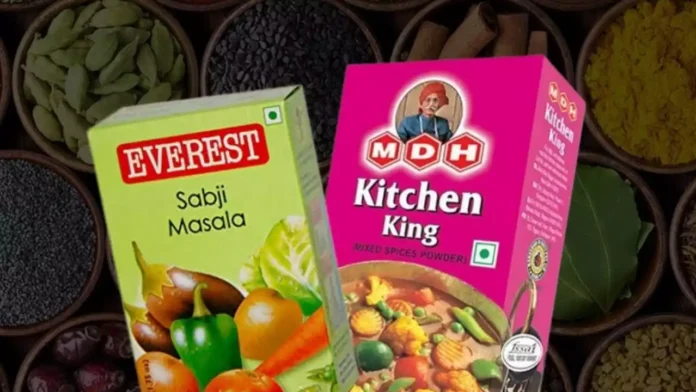The food regulatory body, the Food Safety and Standards Authority of India (FSSAI), has initiated quality checks on MDH and Everest products. This move comes in response to complaints alleging that several popular spice mixes from these leading brands contain traces of ethylene oxide exceeding permissible levels, as reported by official sources.
This move comes after variants of the products from the two major masala brands were recalled in Hong Kong and Singapore.
Sources indicate that during the quality checks, FSSAI will also evaluate whether the products sold by MDH and Everest comply with the chemical residue standards mandated by Indian law.
Sources indicated that when it comes to exports, the regulator might have a limited role since it falls upon the importing country to conduct product testing and authorize entry.
Ethylene oxide and ethylene glycol serve as preservatives in spices and millets, prolonging their shelf life. Additionally, they function as stabilizing agents in pesticides.
Continue Exploring: Singapore recalls Everest’s Fish Curry Masala due to high pesticide levels
According to scientists, exceeding the permissible level of consumption of these chemicals may pose a risk of carcinogenicity.
In the meantime, sources have indicated that the food regulator has initiated sample collection to examine whether ethylene oxide levels in spices exceed the permissible limits.
On April 5, the Centre for Food Safety (CFS) of the Food and Environmental Hygiene Department in Hong Kong issued a recall for MDH and Everest spice mixes. Subsequently, the Singapore Food Agency (SFA) also recalled Everest Masala. Both agencies stated in their press releases that the premixes contained the pesticide ethylene oxide.
In its statement, the CFS Hong Kong announced the recall of MDH Madras Curry Powder, Curry Powder Mixed Masala Powder, Sambhar Masala Mixed Masala Powder, and Everest Fish Curry Masala.
Following the release by CFS on April 5, SFA also issued a recall for Everest Fish Curry Masala on April 18.
In its statement, a spokesperson for the CFS mentioned, “The samples mentioned above were collected from three retail outlets in Tsim Sha Tsui as part of our routine Food Surveillance Programme. Test results revealed the presence of the pesticide ethylene oxide.”
Furthermore, it stated, “The CFS has notified the relevant vendors of these irregularities and directed them to halt sales and withdraw the affected products from circulation. In accordance with the CFS’s directives, the distributors/importers involved have commenced recalls for the affected products.”
It further emphasized that members of the public should refrain from consuming the affected products. Additionally, the trade sector is urged to cease the usage or sale of the affected products promptly if they are in possession of any.
SFA stated that since the implicated products were imported into Singapore, it has instructed the importer, Sp Muthiah & Sons Pte., to initiate a recall of the products. It noted that the recall process is currently underway.
SFA stated in its release, “Ethylene oxide, a pesticide unauthorized for food use, is permitted for sterilizing spices under Singapore’s food regulations. It is commonly employed to fumigate agricultural products to thwart microbial contamination.”
Continue Exploring: Nestle faces regulatory heat as FSSAI launches probe into Cerelac sugar controversy
Furthermore, it highlighted that while there’s no immediate danger associated with consuming food contaminated with low levels of ethylene oxide, prolonged exposure could result in health complications.
SFA also mentioned in its statement, “The International Agency for Research on Cancer has categorized ethylene oxide as a Group 1 carcinogen.”
This isn’t the first instance where Everest has faced scrutiny from an overseas food regulatory body.
In 2023, the US Food & Drug Administration recalled Everest Sambhar Masala and Garam Masala after samples tested positive for Salmonella. Consumers were advised not to consume the products and to dispose of them.


